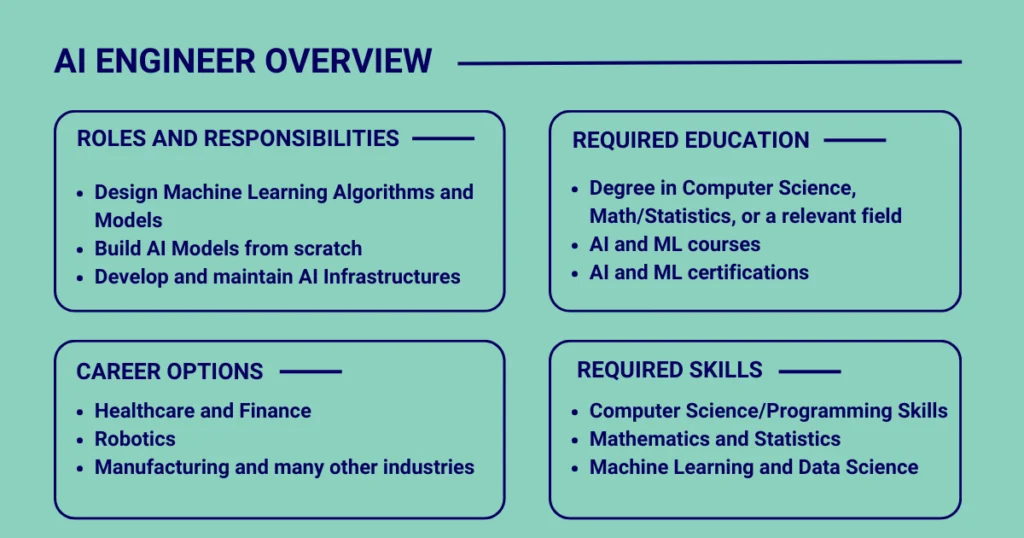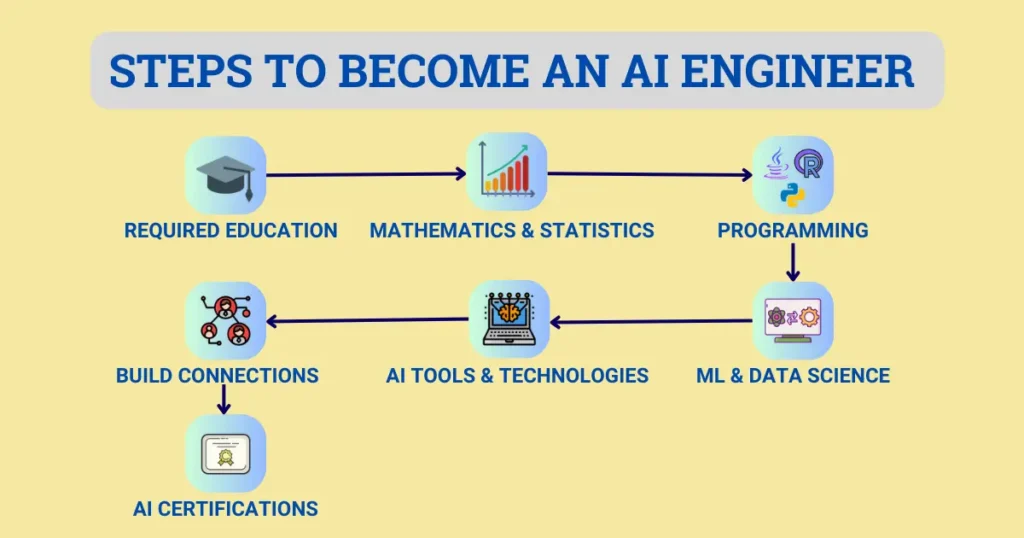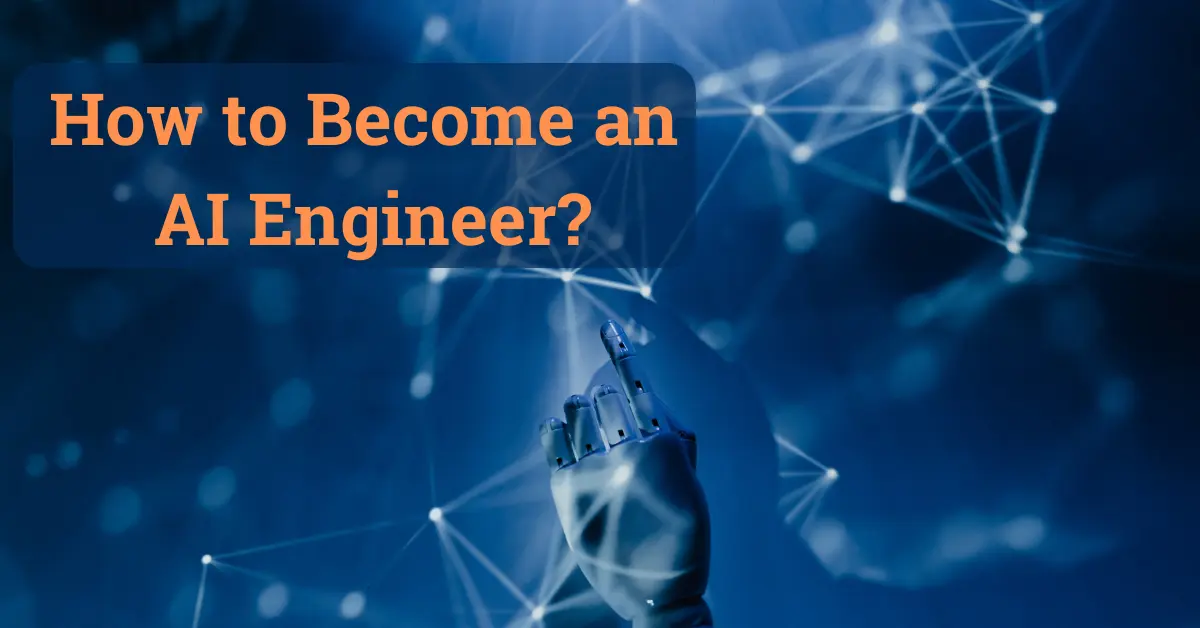Are you looking for a step-by-step guide on how to become an AI Engineer? You landed at the right place, and this article will cover the essential details and skills required in Artificial Intelligence Engineering and kick-start your career in this field.
“The future is Artificial Intelligence” – You might have heard this statement, and there is a strong buzz in the market. This statement is justified, as according to the World Economic Forum, there will be a huge demand for these engineers in the future, and is expected to grow by 40% or around 1 million job opportunities, for these specialists in the coming years.
Table of Contents
What is an AI Engineer?
An AI engineer designs and develops intelligent machines (AI systems) by implementing algorithms and their skills related to machine learning, data science, deep learning, and software engineering.
What does an AI Engineer do?
An AI Engineer works and plays with large data sets to design and create algorithms and use expertise to build intelligent applications and systems that can learn and make decisions as humans do.
These engineers work on different projects and play a key role in enhancing various industries like healthcare, business, finance, etc.

Required Education and Skills
Education
- A bachelor’s degree in either computer science, data science, or math/statistics is required.
Technical Skills
- Computer Science/Programming Skills: Sound knowledge of programming languages like Python, Java, R, and C++. Also, a strong foundation is required in computer science which includes data structures and algorithms.
- Mathematics and Statistics: This includes a strong understanding of calculus, linear algebra, probability, and statistics.
- Machine Learning and Data Science: These engineers should be skilled in machine learning algorithms such as logistic regression and linear regression, etc., and also possess data science skills like collecting, cleaning, and analyzing large data sets and creating models.
- Tools and Technologies: It requires knowledge of big data technologies such as Apache Spark, Hadoop, MongoDB, and some frameworks like TensorFlow.
- NLP and AI Models: Good knowledge of Natural Language Processing (NLP) and know how to work with different AI models like Naive Bayes, Hidden Markov, Gaussian mixture models, etc.
- Algorithms and Applied Mathematics: It includes a strong understanding of algorithms and applied mathematics like partial differential equations, Lagrange, quadratic programming, etc., to create, modify, and use AI models.
Non-Technical Skills
- Strong aptitude, problem-solving, critical thinking, and decision-making skills.
- Good soft skills like communication, presentation, teamwork, and collaboration.
- Ability to handle projects, teams, and timelines.
- Possesses business knowledge of various industries.
Steps to Become an AI Engineer

Step 1: Get the required education
The first step is to acquire the required education – a bachelor’s degree in either computer science, data science, math/statistics, or a relevant field.
If you’re a college student, you can choose an AI foundation course or training and further advanced courses, followed by a few certifications.
Step 2: Gain strong knowledge and build a foundation in mathematics and statistics
Learn and practice concepts of mathematics and statistics like calculus, linear algebra, regression analysis, probability, hypothesis testing, etc.
Step 3: Develop programming skills
Pick one language from Python, Java, or R based on your interest, learn its concepts, and do various assignments.
Step 4: Learn Machine Learning, deep learning, and data science concepts
These skills are a must. Take a course on machine learning and data science and develop these skills. Work on related projects and get some hands-on experience.
Step 5: Gain hands-on experience in AI tools and technologies
After learning programming, machine language, and data science skills, you should try to gain hands-on experience in the AI domain. For this, build your CV and try to get internships and projects.
Step 6: Grow your professional network and build connections with AI experts
Discuss things with the AI experts, talk to them, and know-how and what they are doing. Don’t hesitate to ask for internships or jobs in their organizations. They can also guide you in finding the projects and gaining hands-on experience.
Step 7: Have AI certifications
Many well-known universities provide the proper AI curriculum, prepare you for AI certifications, and provide placement assistance. Take the specialized courses, complete the AI certifications, modify your CV, and add the AI skills.
Roles and Responsibilities
- Design and develop machine learning algorithms and models.
- Build AI models from scratch through algorithms, neural networks, and computer programming.
- Work with large datasets – collecting, cleaning, and analyzing large data sets and efficiently extracting data.
- Build and deploy machine learning models to create AI applications that perform complex tasks and solve problems.
- Assess the model performance using different techniques.
- Optimize the models to improve accuracy and efficiency.
- Develop and maintain AI infrastructures.
Average Salary
The average salary varies depending on the experience level, location, and industry.
For instance, if we talk about the United States and India locations, the following is the average annual average of an Artificial Intelligence engineer as per experience:
| Experience | United States | India |
| Entry-level (0-2 years) | Around $85,000 to $90,000 | Around INR 4 to 7 lakhs |
| Mid-level (2-5 years) | Around $105,000 to $110,000 | Around INR 7 to 15 lakhs |
| Senior-level (5-10 years) | Around $125,000 to $130,000 | Around INR 15 to 30 lakhs |
| Super-Senior (10+ years) | Around $145,000 to $150,000 | Around INR 30+ lakhs |
Career Options
Many industries use Artificial Intelligence to enhance their work, and AI engineers help them to achieve their goals. So, there are many career options available for these engineers.
Following are some of the industries using AI:
- Healthcare
- Finance/Financial services
- Manufacturing
- Business
- Cybersecurity
- Robotics
- E-commerce
Courses and Certifications
There are many well-renewed universities as well as companies providing courses and certifications.
Following are some of the AI courses:
- AI for Everyone by Andrew NG – DeepLearning.AI
- Harvard Business School – Artificial Intelligence Course
- AI Graduate Program by Stanford University School of Engineering
- Artificial Intelligence A-Z™: Build an AI with ChatGPT4 – Udemy
Following are some of the AI certifications:
- IBM Applied AI Professional Certificate – Coursera
- IBM Data Analyst Professional Certificate
- Microsoft Certified: Azure AI Fundamentals
- Google Data Analytics Certificate
- CertNexus Certified Artificial Intelligence Practitioner Professional Certificate – Coursera
Frequently Asked Questions
Q1: What degree do you need to be an AI engineer?
A: A bachelor’s degree in computer science, data science, math/statistics, or any related field is required.
Q2: How long does it take to become an Artificial Intelligence (AI) engineer?
A: It depends upon various factors like your experience, knowledge, what course you have opted for, etc., but on average, it may take around 6 to 12 months.
Q3: How to become an AI engineer after the 12th?
A: Acquire a bachelor’s degree in a related field like computer science, data science, or math/statistics and acquire technical and non-technical skills like programming, maths and statistics, machine learning, soft skills, etc., followed by AI courses and certifications.
Q4: How to become an AI engineer without a degree?
A: Generally, a degree is required. But it’s not impossible. On acquiring the required skills and hands-on practice, some companies could offer you a job!
Q5: Is AI engineering a good career option?
A: Yes! The demand is increasing gradually, and according to the World Economic Forum, it expects to grow by 40%, or around 1 million job opportunities will be available.
Q6: How to become an AI engineer after BCA?
A: After BCA (graduation), acquire technical and non-technical skills like programming, maths and statistics, Machine learning, soft skills, etc., followed by AI courses and certifications. We have covered the step-by-step guide you can follow.
Q7: Is AI Engineering hard to study?
A: AI Engineering seems to be difficult because of the various skills required like programming skills, mathematics, statistics, algorithms, machine learning, data science, etc. But with a proper road map, dedication, and consistency, you can acquire the necessary skills.
Q8: How fast can I become an AI engineer with zero experience?
A: It depends upon various factors like your experience, knowledge, what course you have opted for, etc., but, on average, it may take around 6 to 12 months.
Q9: What is the roadmap to becoming an AI engineer?
A: The short answer to this question is to acquire a bachelor’s degree in a related field like computer science, data science, or math/statistics and further acquire technical and non-technical skills like programming, maths and statistics, machine learning, soft skills, etc. followed by AI courses and certifications.
We have already covered a step-by-step guide for the detailed answer.

